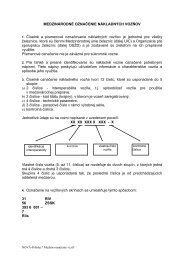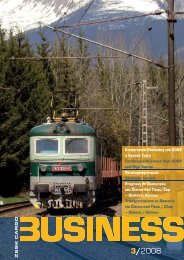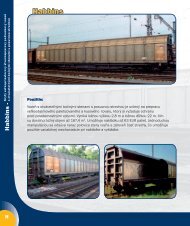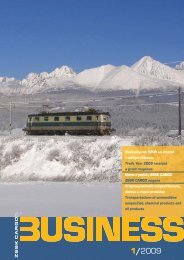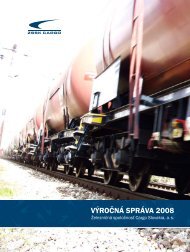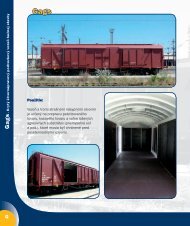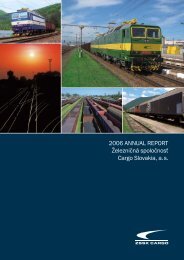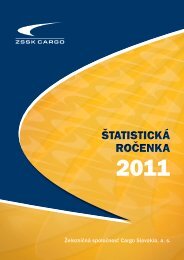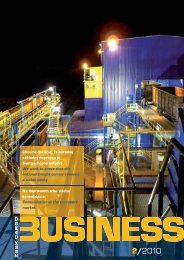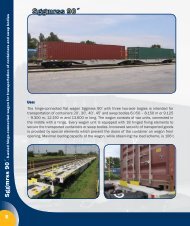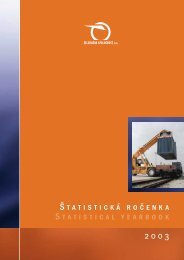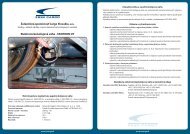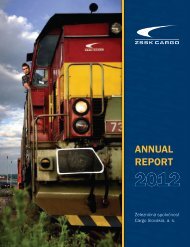CARGO BUSINESS 1-10.indd - ZSSK Cargo
CARGO BUSINESS 1-10.indd - ZSSK Cargo
CARGO BUSINESS 1-10.indd - ZSSK Cargo
- No tags were found...
Create successful ePaper yourself
Turn your PDF publications into a flip-book with our unique Google optimized e-Paper software.
ostí, ale môjho vzťahu k železnici<br />
Interview with general representative of <strong>ZSSK</strong> <strong>CARGO</strong> in<br />
Poland Mr. Ivan Ružbacký<br />
In April last year, there was a change in the general representative<br />
position in Warsaw. Mr. Jiří Hanzal - an expert in rail traffic of many<br />
years, was replaced by a graduate of humanistic sciences in Poland -<br />
Mr. Ivan Ružbacký. It is therefore quite natural that we first asked him<br />
where he found the courage to take over this office.<br />
- I did not undertake this post as a fresh university graduate, but later,<br />
after having gained relevant experience as an assistant of general<br />
representative in Poland. I have been living in Poland for almost twelve<br />
years and I know the Polish life and institutions. Thanks to Mr. Hanzal,<br />
who I respect very much, I could quickly become familiar with the<br />
issues of freight traffic. I would also like to mention that this is not just<br />
a question of my abilities, but of my relationship to railway, since my<br />
grandfathers, my father as well as my uncles used to work in railways;<br />
my grandfathers as engine drivers, my father as a conductor and my<br />
uncles as engine drivers. I was supposed to become a railwayman<br />
too. I completed a Secondary Industrial School –majoring in electrical<br />
engineering in transport and communications, with my field of study<br />
being electric traction and power engineering in transport. After<br />
I completed my secondary school, I decided to go to Poland to study<br />
humanistic sciences.<br />
I assumed I was going to say goodbye to the tradition of railways.<br />
Sometimes one has certain plans, but life brings along the changes.<br />
I had no idea I would ever get back to railways. After my university<br />
studies, I taught at the elementary school, then I worked at the Slovak<br />
Institute, which is part of the Embassy of the Slovak Republic in<br />
Poland. In April 2008, I entered a job in <strong>ZSSK</strong> <strong>CARGO</strong> as an assistant<br />
of general representative.<br />
You have been a general representative of <strong>ZSSK</strong> <strong>CARGO</strong> in Poland<br />
since 1. April 2009. What ideas did you have when taking this office<br />
- It was a big challenge for me. I knew that it would not be easy. Every<br />
day brings new issues to be resolved. I wanted to keep going and<br />
continue working the way Mr. Hanzal had already started. And of<br />
course, I wanted to provide our customers with prompt services and<br />
services of high quality, to maintain good reputation of our company.<br />
Another challenge for me was to acquire new customers, to strengthen<br />
good relations with PKP <strong>Cargo</strong> and to increase use of border crossings<br />
with Poland.<br />
How could you assess the cooperation with our biggest Polish partner<br />
PKP <strong>Cargo</strong>, S. A. from your perspective<br />
- As any representative, I would like to maintain good relationships<br />
with our customers. PKP <strong>Cargo</strong> is not only our customer, but also<br />
a partner, and therefore I am doing my best to maintain relationships<br />
above standards. Communication, mutual support and cooperation<br />
in trade and operation area are at a high level and they are constantly<br />
improving.<br />
Did the crisis have an impact on a number of transportations in<br />
2009 How do you see the future<br />
- Decline in volumes from Poland to Slovakia for 2009 is around 36%<br />
and from Slovakia to Poland approximately 27.6%. It was influenced<br />
not only by the crisis but also by value of the Euro in Poland. In the<br />
previous year, value of the Polish zloty for the Euro increased by<br />
a third, which negatively affected import to Poland. Following the<br />
adoption of the Euro in Slovakia, our transport services became<br />
more expensive as well. Many transit transportations from north to<br />
south and back were carried out via Czech Republic or from east to<br />
west across Poland. There is a great chance to increase the number<br />
of transportations in 2010 and that in import of building materials<br />
for construction of roads and highways in the Polish territory. This<br />
is something I counted in last year, however the crisis postponed<br />
everything.<br />
I hope that this year the Poles will commence their building activities<br />
and will import necessary materials also from Slovakia. For Slovakia,<br />
Poland is also slowly becoming a transit country from and to Russia.<br />
Transportations, which used to be carried out via Ukraine, were moved<br />
to Poland. There are also opportunities for Polish sea ports to be used<br />
for transportations. Their better use and interconnection to railroads<br />
can increase the number of transportations not only in Poland but also<br />
in Slovakia. Regarding the possibilities of transportations this year,<br />
I would be happy if 2010 was just as 2008, but due to the continuing<br />
crisis, it probably will not be possible. But anyway I hope that the<br />
situation will be better than last year.<br />
Thank you for the interview.<br />
Svetlana BELEJOVÁ<br />
What were your main achievements in the previous year 2009 in<br />
Poland<br />
- It was a lot and I succeeded only thanks to our people and people<br />
of Polish <strong>Cargo</strong>. The approval of Polish Railway Regulatory Authority,<br />
concerning the operation of Slovak locomotives of 131 series in<br />
Poland, will have a great impact on further improvement of quality<br />
of provided services. At the beginning of the year, after a year of<br />
negotiations, we managed to obtain an approval for one locomotive,<br />
which was adjusted for operation on Polish railroads. By the end of<br />
the year, another 8 locomotives of 131 series were approved and<br />
tested. After completion of the Polish language course, ten drivers had<br />
a medical check-up in Poland and then they were re-trained according<br />
to Polish regulations. We were able to obtain an approval from the<br />
Polish infrastructure to carry out transportation of block train, 600<br />
meters long, via border crossing station Skalité, where the train length<br />
is limited to 300 meters, to Černjachovsk in the Kaliningrad region in<br />
Russia. Currently, it is only one journey per day, but I hope that in the<br />
future we will not have to divide trains anymore.<br />
14/15



